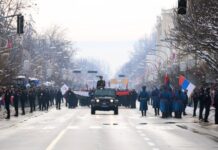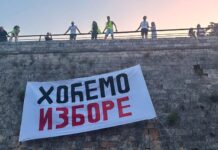Parliamentary elections will be held in Kosovo on February 9. The electoral campaign is already near its end. “Thank God!” many would say. In this article you can read what dominated during this campaign and what young men and women in Kosovo think of this very important event.
Perspektiva Plus talked, especially with young people who are voters for the first time, about their impressions of what has been presented so far in the programs of the candidate parties in the political race and what they expect from these elections.
Uma Nurković, 18 years old from Peja, on Sunday, February 9, will exercise her right to vote for the first time as a citizen of Kosovo. She comes from the Bosnian community from this city. Uma sees her vote not only as an exercise of a right but as an opportunity to be part of something bigger and says that she expects these elections to be a fair process in which each vote counts and that she wishes that the leaders will work towards progress and better opportunities for all ethnic communities without distinction.
“As a first-time voter, I feel excited because I finally have the opportunity to make my voice heard. I look forward to seeing how my choice, along with others, shapes the future. I can say that voting is not just a right, it is a chance to be part of something bigger, and I am proud of this step. For these elections, I expect a fair and transparent process where every vote is counted and respected. I hope for leaders who will work toward stability, progress, and better opportunities for all communities,” Uma told Perspektiva Plus.
Uma concluded by saying that above all, she expects that these elections will bring changes that will improve people’s daily lives and contribute to a prosperous future, and that the voice of the citizens will be heard by the leaders, making them act and not just make promises during the campaign.
“Most importantly, I expect these elections to bring about positive changes that will improve people’s daily lives and contribute to a more peaceful and prosperous future. It is important that political parties really listen to the people and take action, not just make promises during the elections,” concluded Uma.

Uma Nurkovic
Meanwhile, 19-year-old Omer Honsic, also from Peja, said that it is important that, as young people, they make a choice based on the analysis of the programs presented by political parties and not be guided by the emotions of the moment.
“I consider the right to vote one of the greatest privileges of democracy and a civic responsibility of extraordinary weight. Being a first-time voter is a mixed feeling of excitement and responsibility. On the one hand, I feel a special emotion that I can finally directly influence the future of my country, selecting the representatives who will make decisions that have an impact on our daily lives. On the other hand, I am fully aware that each vote has its own weight and that it is important to make an informed choice based on deep analysis of political programs and not on momentary emotions or external influences. This moment makes me reflect on the power of active participation in democracy and the importance of preserving the integrity of this process. Being a young citizen participating in the elections for the first time, I feel part of something much bigger than myself—a mechanism that shapes the future of our country and society,” Omer told Perspektiva Plus.
Asked what he expects from the elections, Omer said that a real democracy is measured not only by the results of the elections but also by the way they are held and that as citizens we need representatives who understand the role of meritocracy and transparency.

Omer Honsic
“First of all, I expect from these elections a fair, transparent process that is not influenced by manipulation or political pressure. Healthy democracy is measured not only by the final result of the elections but also by the way they are conducted, by respecting the rights of the voters, and by the opportunity of every citizen to freely express his will. Also, I expect that these elections will bring fundamental changes in the way politics deals with citizens’ interests, leaving behind empty rhetoric and focusing on concrete solutions to the problems that affect us all. In a society where many young people are facing a lack of perspective and emigration has become a common solution, I hope that the results of this election reflect real change and bring about policies that create real opportunities for development. More than ever, we need representatives who understand the importance of investments in education, economy, and social justice, as well as a government that promotes meritocracy and transparency,” said Omer.
This 19-year-old also expressed concern over the lack of quality policies for young people, mentioning a number of issues up to the lack of policies that would contribute to a cleaner environment.
“In our society, there are a number of challenges that require urgent addressing by politics, but what worries me the most is the lack of sustainable policies for young people. I want to see radical changes in the way education is approached, moving from a rigid and theoretical system to a model that promotes critical thinking, innovation, and real preparation for the job market. Also, I would like to see more commitment to social justice, ensuring that all citizens, regardless of background or economic status, have equal access to basic opportunities and services. Another essential issue is the transparency and accountability of institutions. We live in a time where citizens’ trust in politics is at low levels, and this can only change if our representatives show a sincere commitment to real reforms and to a public administration that does not operate on the basis of nepotism or corruption. Finally, an important aspect to address is the environment. Policies for nature protection and sustainable development are often overlooked, but they are key to a healthier and safer future for generations to come. These are some of the changes that I would like to see addressed by political parties, and I believe that citizens should be more demanding of those who claim to represent them.”
In conclusion, he called for greater civic awareness and greater seriousness towards going out to vote, not seeing these elections as a formal but substantive act.
“Besides the importance of the election process itself, what I want to emphasize is the need for greater civic awareness. Many people still see voting as something trivial, a formal act with no real impact on their daily lives. But really, every vote is a powerful act that determines the direction of a country for years. Precisely for this reason, we must have a more critical approach to politics, not allow emotions or manipulations to guide us, but make decisions based on detailed analysis of candidates’ programs and stances. Personally, I see these elections as an opportunity to redefine our priorities as a society. I am aware of the challenges that exist, but I also believe that every generation has a moral obligation to contribute to improving the situation. There is no room for indifference because indifference is what enables the system to remain unchanged. Voting is not only a right but also an obligation to ourselves and the generations that will come after us. Therefore, these elections are not only a formal act but also an opportunity to build a fairer, more equal, and more developed future for everyone,” concluded Omer.
25 years have passed after the war has ended, and Kosovo still lacks uninterrupted running water, and electricity. The air quality, especially in the capital, is among the worst in the region and sometimes in the world. Yet so far, no program has raised or seriously addressed any of these issues. 25 years after the end of the war, citizens of the Republic of Kosovo do not have health insurance. Education based on the results of the PISA test is among the poorest in terms of quality. These elections could potentially yield solutions regarding these issues, despite the campaign offering none so far. And how did the campaign unfold? The campaign was characterized by insults, accusations, and offensive comparisons. By all parties. Making this campaign unprecedented in its nature.
Writes: Hanmie Lohaj














